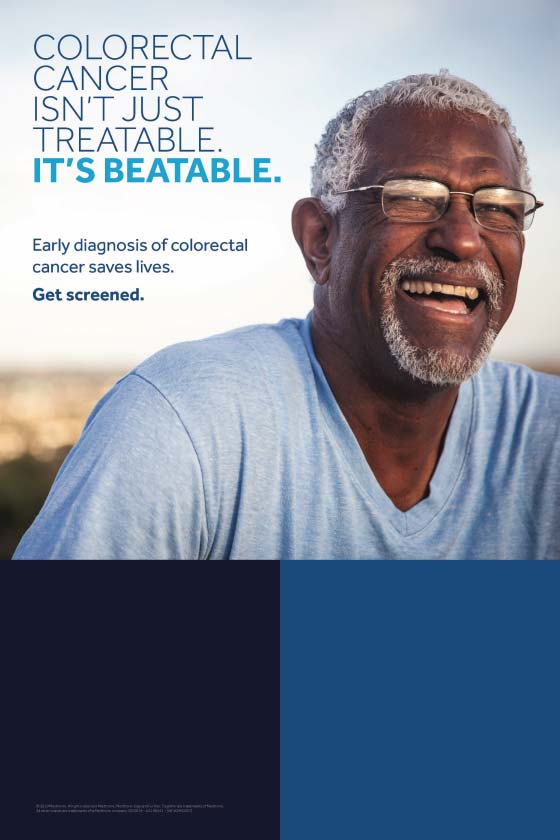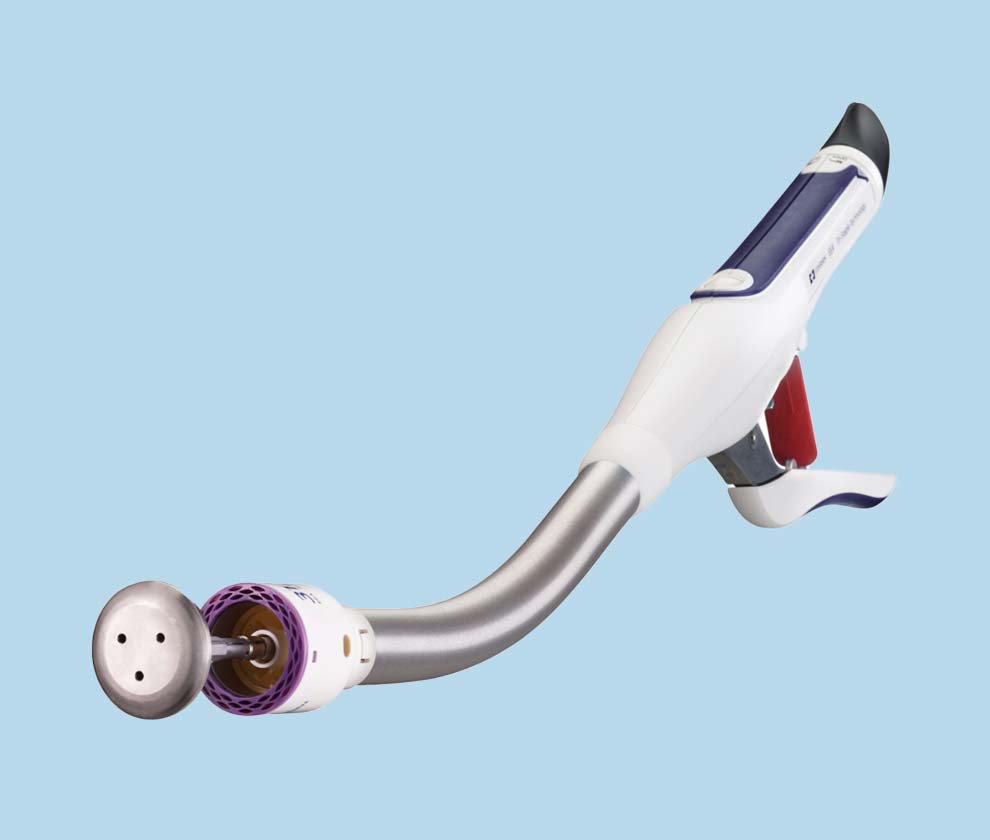

Encourage your patients who meet the criteria to get screened.
GET PATIENT OUTREACH TOOLKITWe’re partnering with health care providers around the country to get the message out to patients to get screened for colorectal cancer.
Encouraging patients to get routine screenings at recommended intervals is important.¹ Especially since screening rates are down due to COVID-19.²
Colorectal cancer by the numbers:
3rd leading cause of cancer deaths in men and women combined in the U.S., excluding some types of skin cancer.³
In 2021, an estimated 150,000 new colorectal cancer cases will be diagnosed in the U.S.³
With early detection before it spreads, the 5-year relative survival rate is 90%.¹
Screenings have declined by 86% during COVID-19.² That means many new cases of colorectal cancer could either go undetected or end up being diagnosed at later and less treatable stages.² Early detection improves the odds of successful treatment.¹ It’s important to let your patients know they have options for screening, even during the pandemic. Encourage your patients who meet the criteria to get screened.
To help you connect with your patients and encourage them to come in and talk to you, we’ve created this toolkit to assist you. It includes a customizable set of patient outreach assets including:
Social media posts
Digital ad templates
Digital postcard
Email template & SMS copy
Patient discussion guide

It’s no longer just an older person’s disease.
Colorectal cancer rates are rising in younger adults.⁴
If you have an average risk, get screened starting at age 45¹,*
And have follow-up screenings at regular intervals as guided by your physician until age 75. People with higher risks may need to screen earlier and more often.¹
Treatable. Survivable.¹
Colorectal cancer has a 90% 5-year relative survival rate when detected at an early stage before it spreads.¹
Talk about the risk factors.
Ask your patients if they have some of the more common risk factors for colorectal cancer:
A family history of colorectal cancer or colorectal polyps.⁵,⁶
Lifestyle factors like smoking, excessive drinking, obesity or sedentary lifestyle.⁵,⁶
Certain ethnic groups. African Americans have higher colorectal cancer incidence and mortality rates than any other race.⁵,⁶
Other colon irritable bowel conditions like ulcerative colitis and diverticulitis.⁶
Screenings can help detect it earlier, when it may be more treatable.¹
Screening tests such as a colonoscopy can help detect the presence of cancer or colorectal polyps which can be removed before they become cancerous.¹
They have options.
Screenings are available, even during COVID-19. There are many screening options to choose from, including in-person and at-home screenings, as well as invasive and non-invasive methods. These include the fecal occult blood test (FOBT), fecal immunochemical test (FIT), flexible sigmoidoscopy, double contrast barium enema, and colonoscopy.⁷ Encourage patients to meet with you to discuss which screening method is right for them.
Helen was diagnosed with colorectal cancer at 45. Now a survivor, her story can help inspire your patients into action.
We offer a comprehensive suite of state-of-the-art products for colorectal surgeries.
Your hands and our technologies can transform colorectal health.
SEE PRODUCTS
The EEA™ circular stapler with Tri-Staple™ technology provides 62 percent additional security to the staple line during the critical healing period.⁸,†
Together we can help more patients find your practice. Patients and physicians frequently search our Medtronic Physician Finder tool to locate GI specialists and other clinicians. To add your information to the Physician Finder, simply fill out the form and we’ll take care of the rest.
SIGN UP NOW
Collaboration is essential to achieving better clinical and economic outcomes.
Improving patient outcomes is at the heart of everything we do. It’s why we work so hard to nurture powerful relationships with stakeholders across the industry. By working together, we are catching colon cancer earlier and driving less invasive approaches to care that will push the future of colorectal health forward — and improve your patients’ lives.
LEARN MORE* People are considered to be at average risk if they do not have: a personal history of colorectal cancer or colorectal polyps, a family history of colorectal cancer, a personal history of inflammatory bowel disease (ulcerative colitis or Crohn’s disease), a hereditary colorectal cancer syndrome, such as familial adenomatous polyposis (FAP) or Lynch syndrome (hereditary non-polyposis colon cancer or HNPCC), a personal history of getting radiation to the abdomen or pelvic area to treat a prior cancer.
† Compared to two-row circular staplers.
REFERENCES:
1. American Cancer Society. “Colorectal Cancer, Early Diagnosis and Staging” cancer.org website. Digital PDF. Revised June 29, 2020.
https://www.cancer.org/content/dam/CRC/PDF/Public/8606.00.pdf
2. Goshua, Anna. Scientific American. “The Pandemic Is Delaying Cancer Screenings and Detection” scientificamerican.com website. December 2020. Accessed February 4, 2021.
https://www.scientificamerican.com/article/the-pandemic-is-delaying-cancer-screenings-and-detection/
3. American Cancer Society. “Key Statistics for Colorectal Cancer.” cancer.org. Updated January 12, 2021. Accessed February 4, 2021.
https://www.cancer.org/cancer/colon-rectal-cancer/about/key-statistics.html
4. Colorectal Cancer Alliance. “Colorectal cancer facts and statistics.” CCA.org website.
https://www.ccalliance.org/colorectal-cancer-information/facts-and-statistics
5. Center For Disease Control and Prevention. “What are the risks for colorectal cancer?” cdc.org website. Updated February 2020. Accessed January 21, 2021.
https://www.cdc.gov/cancer/colorectal/basic_info/risk_factors.htm
6. Mayo Clinic Staff, Mayo Clinic. “Colon cancer risk factors.” Mayoclinic.org website. Accessed January 25, 2021.
https://www.mayoclinic.org/diseases-conditions/rectal-cancer/symptoms-causes/syc-20352884
7. Center for Disease Control and Prevention. “Colorectal Cancer Screening Tests. cdc.gov website.” Updated 2/10/20. Accessed 2/5/21.
https://www.cdc.gov/cancer/colorectal/basic_info/screening/tests.htm
8. Based on internal test report #RE00276578, EEA™ circular stapler with Tri-Staple™ technology compared to the top five two-row circular staplers in the markets for number of staples in the circular staplers. June 24, 2020.